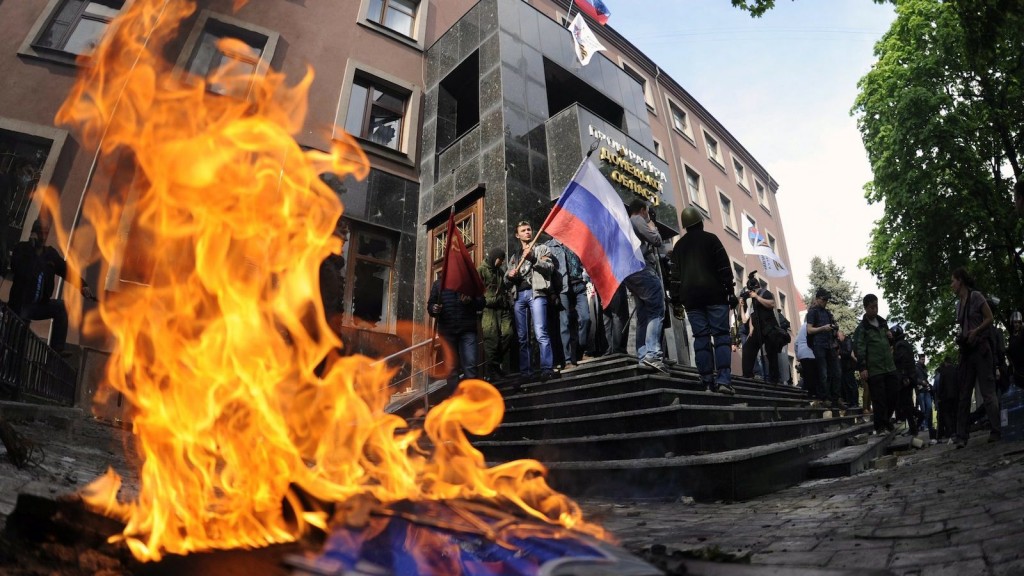Morning 5: Pro-Russians shoot down Ukrainian gunships
Also: U.S. senators hope to force Keystone approval
Pro-Russian protesters burn Ukrainian symbols in front of the regional administration building after clash with police in Donetsk, Ukraine, Thursday, May 1, 2014. Anti-government demonstrators in Donetsk have stormed the local prosecutor’s office. The clash came after a march by several hundred people carrying flags of the Donetsk People’s Republic, a movement that seeks either greater autonomy from the central government, or independence and possible annexation by Russia. (AP Photo/Evgeniy Maloletka)
Share

We tell you five things you need to know this morning.
1. Pro-Russians shoot down Ukrainian helicopters. The anti-Kyiv forces in eastern Ukraine are typically called occupiers and separatists, given their propensity for storming administrative buildings, and their expressed desires for political autonomy. Kyiv officials call them terrorists. Today, after the pro-Russians countered a Ukrainian attack on Slovyansk by downing two Mi-24 gunships—and killing a pilot—BBC unleashed a new descriptor: rebel. Ukraine’s defence ministry says a portable missile took down the helicopter, proof that the counterattack was more sophisticated than the work of an amateur militia.
2. Don’t expect an inquiry into murdered aboriginal women. No matter how many times the New Democrats or Liberals call for a probe into missing or murdered indigenous women—a number that could be as high as 1,200—the Tories rebuff the calls by citing recent budget investments. CBC learned that a special committee’s draft report on the file included a recommendation to launch an inquiry, but that detail was scrubbed from the final report.
3. Senators wants to force Keystone XL’s approval. American Senators, that is. Louisiana Democrat Mary Landrieu and North Dakota Republican John Hoeven don’t want to wait for President Barack Obama’s long-awaited decision on the long-planned pipeline from Alberta’s oilsands to the American heartland. They hope to pass a binding bill that approves the project and forces the president’s hand. They require a two-thirds majority to outmaneuver Obama’s prospective veto of the bill. Hoeven’s most recent support: 56. He needs to get to 67.
4. GM gets an easy ride in Canada. Congress hauled General Motors CEO Mary Barra in front of two committees as the government undertakes a handful of investigations into the safety of GM vehicles. The Globe and Mail reminds readers—and drivers—that no such urgency occupies the House of Commons. NDP MP Hoang Mai attempted to raise a GM auto recall at the House transport committee, but a Conservative majority chose to focus on rail safety. Tory MP Larry Miller, the committee chair, was blunt: “You’ve got to set priorities.”
5. Gerhard Schroeder parties with Putin. The former German chancellor turned 70 and celebrated in St. Petersburg. Among the guests at his extravagant party was Vladimir Putin, the same Russian president who’s staring down German diplomats on the fragile political situation in eastern Ukraine. Philipp Missfelder, a foreign policy expert in current Chancellot Angela Merkel’s administration, also attended. Merkel was displeased. Imagine any Canadian official similarly undermining Prime Minister Stephen Harper’s authority. Chills.